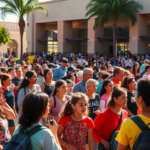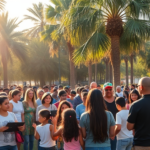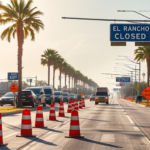I’m sorry for the confusion, but it seems there was an error in the insertion of the headline and content. Let’s address the article correctly concerning the Laken Riley Act and its implications for the Rio Grande Valley community:
Senators Push for Amendments on Laken Riley Act as Immigration Policy Debate Heats Up
The Senate is set to begin debate on the divisive Laken Riley Act, a bill that mandates the deportation of immigrants charged with minor crimes. As the Act moves forward, Washington Senators Maria Cantwell and Patty Murray have announced their intentions to push for significant amendments to better align the bill with Washington State laws and protect vulnerable immigrant groups.
Background and Controversy
Passed by the House with substantial Republican support and some Democratic backing, the Laken Riley Act is named after a murder victim whose tragic death heightened tensions around immigration policies. The proposed legislation calls for deporting immigrants charged with minor crimes—a move critics argue could drain necessary resources and put non-violent, immigrant groups at risk, such as Dreamers and those with Temporary Protected Status (TPS).
President Joe Biden has recently extended TPS protections, aiding nearly one million immigrants from countries including El Salvador and Venezuela. However, with Donald Trump set to reassume the presidency, concerns arise about potential reversals of these protections.
Washington Senator Maria Cantwell welcomes discussion on immigration but calls for amendments that reconcile this legislation with existing state laws. “The immigration issue deserves to be discussed,” Cantwell stated, emphasizing the need for bolstering border security and addressing the influx of fentanyl.
Senator Patty Murray, on the other hand, opposes the current form of the Act, fearing it misappropriates resources. “Our efforts should target violent criminals. This bill as it stands risks targeting essential workers who haven’t been convicted of a crime,” Murray’s spokesman, Amir Avin, warned.
Local Impact on the Rio Grande Valley
The Rio Grande Valley, a region deeply intertwined with immigration policy, stands at the frontline of any amendments and legislative outcomes derived from the Laken Riley Act. With a significant immigrant population contributing to various sectors, primarily agriculture, policies that encourage mass deportation could drastically affect the local economy and workforce.
Dr. Julie Rosas, an immigration policy expert from South Texas College, asserts, “The Valley is a living testament to how immigration policies react on the ground. Stricter policies could lead to labor shortages and heightened economic instability at a local level.”
For Valley residents, many of whom possess mixed immigration statuses within their families, the stakes are high. Marco Sanchez, an RGV community advocate, stressed that “These policies could break apart families and uproot individuals who are integral to our community’s fabric.”
Concerns and Connections to Previous Issues
The prospect of increased deportation efforts under the Laken Riley Act ties back to prior advocacy movements for immigrant protections that have been active in the Rio Grande Valley. Community leaders have long expressed concerns over the heightened criminalization of immigrants and its impact on families’ stability and security. This has been a recurring theme in local discourse, especially following high-profile deportations during Trump’s first term, one of which involved DACA recipient detentions.
Future Implications for the Community
As the Senate prepares for further debate, the outcome of the Laken Riley Act could set significant precedents. For the RGV, it could spark community-organized resistance and renewed calls for comprehensive immigration reform that better addresses local needs and realities.
Valley residents are encouraged to remain informed and engaged as this legislative process evolves. Organizations such as LUPE (La Unión del Pueblo Entero) offer resources and community workshops to discuss potential impacts and prepare residents for changes in immigration status enforcement.
Striking a Balance
The ongoing discourse surrounding the Laken Riley Act highlights the broader struggle to find balanced solutions to America’s complex immigration challenges. With senators like Cantwell and Murray advocating for amendments, there’s hope for a more nuanced approach that respects both national security concerns and the humane treatment of migrants—a balance vital for regions like the Rio Grande Valley.
As the Laken Riley Act draws national attention, it underscores the enduring importance of local engagement and advocacy in shaping policy landscapes that reflect diverse perspectives and realities across the country.







